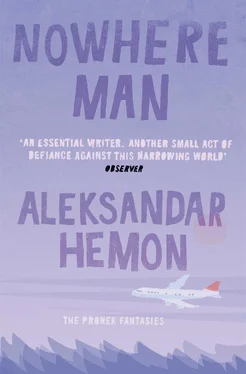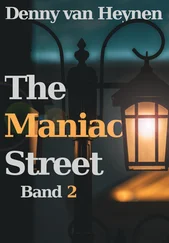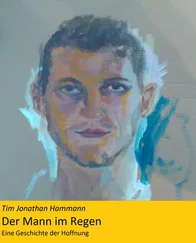Pronek told the real story to Mirza, who already knew it, having scrubbed ship hulls in the navy and gone through the same spectrum of debasement. Both of them came to the conclusion that only an idiot can enjoy the army, and they felt guilty for not being patriotic enough, for not being tougher, for despising their comrades content with the pleasures of masturbation and bad cigarettes. Aware that the army censors might be reading their complaints, they conveyed their unpatriotic misery in the code of Sarajevo slang — which I regret not being able to translate well enough to render its impenetrability.
After three months of basic infantry training, Pronek was nowhere near the pledged masculinity. Indeed, he took a step back when he was transferred to the kitchen. It was a cozy duty precisely because it was nearly absolutely mindless: he washed skyscrapers of oven pans and dishes; he peeled galaxies of potatoes. Pronek worked, ate, and slept, while time crept. He got a potato-peeling companion, a Bosnian from Banja Luka named Ahmed. Ahmed was a cook, but had been demoted after repeatedly talking back to his superiors, all of whom, according to Ahmed, were first-rate motherfuckers. He was a huge hairy man who talked in an abrupt, peevish manner, as if insulted by the other person’s unflinching existence. The first time they peeled the potatoes together, Ahmed kept scowling at Pronek’s dumb ways, criticizing the unnecessary thickness of the peel, and kept showing him the right knife angle. It shortly turned out that Ahmed knew Pronek’s cousin in Banja Luka, that he believed that sevdah was the Bosnian version of blues, and told him he should listen to John Lee Hooker and Zaim Imamovi  and he would see. They came up with their own sevdah-blues songs, describing the potato peeling and the horrors of the army and faraway women. Ahmed liked to read — he was to study literature after the army — and would tell Pronek abbreviated, even if often convoluted, versions of the novels he had read. He liked hard-boiled detective novels and Dostoyevsky. He gave Pronek The Idiot to read, and Pronek found it mind-numbingly tedious and never finished it, but said that he liked its philosophy. After Ahmed went back home a month earlier, Pronek slept sixteen to eighteen hours a day, getting up only to eat and supervise the potato peeling of the kitchen novices, whose hands were covered with cuts and incisions, the buckets in front of them full of bloody water.
and he would see. They came up with their own sevdah-blues songs, describing the potato peeling and the horrors of the army and faraway women. Ahmed liked to read — he was to study literature after the army — and would tell Pronek abbreviated, even if often convoluted, versions of the novels he had read. He liked hard-boiled detective novels and Dostoyevsky. He gave Pronek The Idiot to read, and Pronek found it mind-numbingly tedious and never finished it, but said that he liked its philosophy. After Ahmed went back home a month earlier, Pronek slept sixteen to eighteen hours a day, getting up only to eat and supervise the potato peeling of the kitchen novices, whose hands were covered with cuts and incisions, the buckets in front of them full of bloody water.
After coming back from the army, Pronek refused to answer any of his parents’ questions and provide them with any reason to be proud of his newly acquired manhood. Then he started his studies of General Literature at the Faculty of Philosophy. He chose General Literature chiefly because he had heard from Ahmed that you didn’t have to work much, just read a lot, and that you could bullshit extensively. Within a month of commencing his studies, he stopped attending the classes. It was hard for him to get up in the morning and go to a class knowing that he would have to listen to the self-important suit-and-tie professors delivering their lectures on Ancient Greeks or the lives of Serbian saints. He could not bear to look at the comely, coy young women, ready for a lifetime in a library; scruffy young men, with goatees, and rotten teeth, for whom the line between being drunk and being inspired was forever blurred. Pronek did not hate them or despise them. Looking at them resulted in sorrow clawing at his heart — couldn’t they see how untrue and pointless it all was: the future librarians making copious notes; the poets scribbling their latest confession to themselves in a dog-eared notebook; the professor reading in a droning voice about the saint suffering on top of a mountain?
Thus Pronek skipped early morning classes and spent the morning in bed, staring at the ceiling — a dot here and there, mosquitoes murdered years ago — feeling as if a heavy black cat were sitting on his chest, growling in his face, ready to gouge his eyes out if he just moved. He would try to think up a reason to fight the cat and get up, but couldn’t think of any.
It was on one of those mornings that Pronek entered his poetry-writing period. The first lines of poetry he ever wrote in his native language translate as: “What’s that thing growing out of me/Like a tumor on a sunny day?” The poem was about nothing in particular, apart from his ambition to get the ceiling-staring feeling out. He entitled the poem “Love and Tumors.” The second poem was tougher: he sat facing the empty, blazingly white sheet of paper, and tried hard to think of something he needed to say. Before he wrote the first line, he had the title: “The Deep Sleep.” And so it went — he got out of bed to write poems. They never rhymed, had no stanzas, and made no sense. Soon he started believing that what he wrote was not poetry, but something else, something deeper and more ineffable; something that expressed his feeling of life: a taut heart, tears hiding from his eyes, the liberating hopelessness. Those poems were blues, Mirza ascertained, no doubt about it, and Pronek had an epiphany: he saw himself old and black, sitting on a ramshackle porch with a rambling guitar, delivering narratives of his woes and metaphysical peregrinations. And he was blind too — the only thing he could see was the darkness of his soul.
Quickly did “Love and Tumors” become a blues song. So did “The Deep Sleep” and “I Am Hiding Tears from My Eyes” and “Do Not Close Your Eyes.” Pronek spent days, while his parents toiled for his sustenance, in his room singing, howling (like Howlin’ Wolf), and screaming (like Screaming Jay Hawkins), sometimes getting things out from such depths that their neighbor, a streetcar operator who worked night shifts, banged his fists furiously against the wall and offered to strangle him with his bare hands.
Thus was Blind Jozef Pronek and Dead Souls born of pain and confusion. Mirza, naturally, was the first Dead Soul. They played in the overcrowded Dental Students Club, called predictably Zub (the Tooth) and the Medical Students Club, called, a little less predictably, Kuk (the Hip), to an audience of drunken students, horny and uninterested. Pronek tap-tap-tapped his foot, like Blind Lemon Jefferson did with his cane, Mirza played his short, heartfelt solos, inaudible over the speakers, drowned in the noise of students eager to forget bleeding gums, jars full of fetuses, and spongy hearts. But sometimes, everything would be just right and the smoke from people’s nostrils floated toward them and formed a cloudy aura, like fog coming from the Delta swamps. Pronek would see a pair of eyes watching him just above the surface of the crowd, as if trying to see through to his sinful soul. I could have been the owner of a pair of eyes, as I went to Kuk and Zub , but I do not recall listening to a blues band in those places — I could have been simply too drunk to notice. Toward the end of the song, he would skillfully close his eyes, suggesting that he had just plunged into his own depths. He felt the tickling of gazes moving across his face and neck like long-legged, lithe spiders.
Soon enough, Mirza and Pronek recruited a bass player, named Zoka, and Sila the Drummer, a punk who worked in the Maternity Hospital as maintenance and liked to drink like a fish at Kuk. Sila demanded an explanation of Pronek’s lyrics — he didn’t want to play what he couldn’t understand. Pronek didn’t quite know what the songs were about, except that they were about his feelings. Under Sila’s ferociously inquiring gaze, Pronek had to spin out an elaborate exegesis, comparing himself implicitly to John Lee Hooker and Dostoyevsky which did not help clarify the lyrics at all. Finally, Pronek used soccer references to explain that “Love and Tumors” was about the game you knew you were losing but you still wanted to score, while “Do Not Close Your Eyes” was about being aware what position you were playing on the soccer field of the universe. They played more gigs, even having a couple of shows in Zenica and Mostar, where they almost got beaten up because an idler in bermuda shorts demanded “normal music” and Sila rhetorically fucked his mother. There were no stars in Sarajevo, as everybody knew everybody, and nobody ever forgot the days when you rolled in mud or played marbles, and the local thugs would set you straight if you were too cocky. But there were young women smiling at Pronek and Mirza and even at Sila on the main street. A rotten-teeth poet from General Literature told him that they expected a lot from him. Mirza’s cousin’s boyfriend, who worked for a student paper, asked Pronek if he wanted to write music reviews. “Little money,” he said, “but you’ll have a voice.” “I already have a voice,” Pronek said, but consented.
Читать дальше

 and he would see. They came up with their own sevdah-blues songs, describing the potato peeling and the horrors of the army and faraway women. Ahmed liked to read — he was to study literature after the army — and would tell Pronek abbreviated, even if often convoluted, versions of the novels he had read. He liked hard-boiled detective novels and Dostoyevsky. He gave Pronek The Idiot to read, and Pronek found it mind-numbingly tedious and never finished it, but said that he liked its philosophy. After Ahmed went back home a month earlier, Pronek slept sixteen to eighteen hours a day, getting up only to eat and supervise the potato peeling of the kitchen novices, whose hands were covered with cuts and incisions, the buckets in front of them full of bloody water.
and he would see. They came up with their own sevdah-blues songs, describing the potato peeling and the horrors of the army and faraway women. Ahmed liked to read — he was to study literature after the army — and would tell Pronek abbreviated, even if often convoluted, versions of the novels he had read. He liked hard-boiled detective novels and Dostoyevsky. He gave Pronek The Idiot to read, and Pronek found it mind-numbingly tedious and never finished it, but said that he liked its philosophy. After Ahmed went back home a month earlier, Pronek slept sixteen to eighteen hours a day, getting up only to eat and supervise the potato peeling of the kitchen novices, whose hands were covered with cuts and incisions, the buckets in front of them full of bloody water.










